Universal Credit claimants who have previously taken out a “hardship payment” might be entitled to money back from the Department for Work and Pensions (DWP).
A “hardship payment” is emergency money granted to claimants when their benefit has been cut because of a sanction or penalty for fraud.
It is normally worth roughly 60% of the amount you were sanctioned by in the last month.
The idea is that this payment helps you cover household expenses like food and bills. It is technically a loan, which means it normally needs to be paid back.
However, if you had previously asked for the repayments to stop, but you were refused, you can now ask the DWP to review your case.

This means you could potentially be due money back - but it is still down to the DWP to decide whether you’re owed any refund.
You can ask the DWP to review its decision not to stop the repayment of your ”hardship payment” if all of the following apply:
-
You asked the DWP (either Universal Credit or DWP Debt Management) to waive the repayment of a hardship payment between January 1, 2014 and January 11, 2021.
-
The DWP refused your request to waive the repayment.
-
You have repaid the hardship payment.
You will also need to show that either:
-
You could not afford to repay the hardship payment at that time
-
Repaying it had a significant effect on your or your family’s health or wellbeing.
You can apply from today and the deadline is June 19, 2023. This applies to Universal Credit claimants in England, Scotland and Wales.
The DWP says an application form will become available on its website but this wasn’t live when The Mirror checked today.
You will need to provide evidence from the time you were repaying your hardship payment that shows:
-
You could not afford to repay your hardship payment, or
-
Repaying your hardship payment affected your or your family’s health or wellbeing
This could include:
-
Financial information from the time, such as bank statements, information about loans, or letters from creditors
-
Information from a doctor or other medical professional saying that repaying the money caused a health condition or made it worse
You should also provide information about your income and living costs at the time to support your application.
You can also write a letter, as long as it answers all the questions on the form, and post it to: Debt Management (C), Mail Handling Site A, Wolverhampton, WV98 2DF.
The DWP will decide whether you’re due a refund. This means you’re not definitely guaranteed to get any money back at all.
The DWP will contact you within six weeks of receiving your application to let you know it has been received.
They will then send you a decision about your application within 13 weeks of receiving it.







